Evaluation of Hypernatremic Dehydration in Newborns After Discharge-in a Newborn Clinic
Neonatal Hypernatremic Dehydration
DOI:
https://doi.org/10.4274/jpea.2025.426Keywords:
Dehydration, newborn, hypernatremiaAbstract
Neonatal hypernatremic dehydration (NHD), a consequence of inadequate fluid intake in newborns, can cause morbidity and mortality. This study aims to evaluate the signs, symptoms, and laboratory findings of newborns with NHD and define the approaches that may help to prevent its occurrence. Eighty-five newborns (gestational age ≥37 weeks) with ≥10% weight loss and diagnosed with NHD at their first post-discharge visit were retrospectively evaluated over a five-year period. The control group consisted of 85 healthy newborns with <10% weight loss. Among the NHD group, 54.1% were female, with a mean gestational age 38.1±1.1 weeks, mean birth weight 3359±369 g, mean weight loss of 11.83±1.28%, and a mean age of 3.91±0.9 days at presentation. All mothers exclusively breastfed their infants; however, formula supplementation was significantly more common in the control group (p=0.001). The most common presenting complaints were jaundice (54.1%) and pink-orange discoloration on diapers (25.8%). The presence of black or dark green stool, urination <5 times perday, and pink or orange-stained diapers was significantly higher in the NHD group (p<0.05). Hyperbilirubinemia was also more prevalent in the NHD group (p<0.05). Only 16.5% of the mothers in the NHD group suspected insufficient milk intake. None of the newborns developed severe hypernatremia or complications. Despite breastfeeding education prior to discharge, mothers lacked sufficient knowledge about monitoring feeding adequacy. Educating mothers about signs of insufficient fluid intake, such as jaundice, infrequent urination, pink/orange-stained diapers and dark stools, and closer post-discharge monitoring of at-risk newborns, can help prevent NHD.

Downloads
Published
How to Cite
Issue
Section
License
Copyright (c) 2023 The Journal of Pediatric Academy

This work is licensed under a Creative Commons Attribution-NonCommercial-NoDerivatives 4.0 International License.








